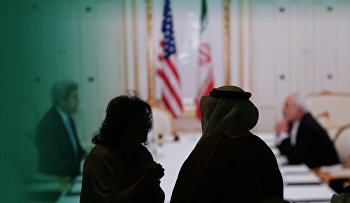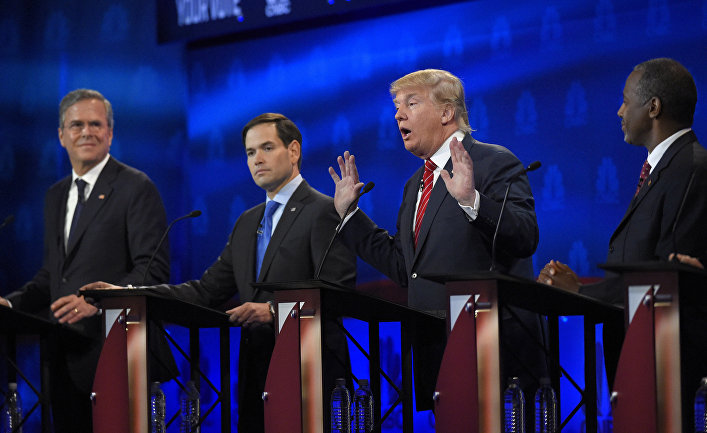After extended dialogues with experts and senior researchers in the US capital, the big picture of the MidEast crises is becoming clearer than could have ever been observed from Egypt. The displeasure and disapproval resulted from the collapse of some Middle-Eastern countries is far less than what was witnessed when the US dived into its military campaign to invade Iraq in the beginning of the first decade in the 21 century and the disastrous consequences it produced.
Political institutions and parties are less willing to be involved in confrontation concerning the situation in the Middle East and the limits that the Russian military intervention imposed on the US's role. There are many factors causing the apathy that is controlling the American mentality towards the serious situation in the Middle East. It's because those terrorist groups form no threat to the US as they are more interested in the fragmentation of countries and establishing their caliphate state that they dream of. There is some concerns of possible terrorist attacks in the US, but the fact remains that confronting the West is not a priority for those terrorist groups, which makes the US's security services anticipating those risks in the future, but not today. Western powers are watching the infiltration of terrorists into Europe in the current wave of migration, especially given the defeat of ISIL by the Russian and international coalition.
'They'd love to do damage': The FBI says ISIS wants to hack parts of the US power grid https://t.co/p0Txo3vHm2 pic.twitter.com/50oEkfjzOv
— Business Insider (@businessinsider) November 1, 2015
Experts are frequently discussing the misery and hopelessness among millions of Arab youth and how it could produce a new generation of jihadists who will hold the West responsible for their despair. According to Nouriel Roubini, an American economist, some of them might find a way to Europe and the US to launch terrorist attacks. However, current situation does not match Washington's claims, as the military expenses are still the same, and the US's contribution to the development and rebuilding of demolished countries doesn't match the value of $2 trillion it has spent on the wars in Iraq and Afghanistan.
Another important factor is the declining dependence on the Middle Eastern oil in the last years, as the issue of energy security is not the top priority anymore, as it was before the massive discovery of shale oil reserves in the US. If we take in consideration the effects of civil wars and border tension on the international oil prices, we would find the relationship is almost counterproductive. The situation in the Gulf, Yemen, Syria, or Libya did not contribute to the collapse in oil prices in spite of previous global recessions. Researches that followed three major historical events — war of 1973, the Iranian revolution of 1979, and the Iraqi invasion of Kuwait 1990, as a result of sharp rise in oil prices. What is astonishing is that the prices are moving towards a wider increase as a result of over-supply, and this leads to fluctuations in the producing countries, not the consuming countries.
1,53 million dollars. That's how much ISIS obtains with crude oil sales DAILY. +50% of it is sold to #US companies. pic.twitter.com/0DZuKlFdeV
— rui borges (@homo_viator) October 31, 2015
Americans are highly interested in the current election battle which seems exciting because of the advance of unconventional figures such as the billionaire republican Donald Trump and the heavy-weight opponent Jeb Bush. The media focus is all eyes on Trump and Hillary rather than tampering with the Middle East. It also helps to highlight internal issues after the disappointment of Barack Obama's presidency, and the appearance of candidates who are rebelling against the political establishment, representing a reverse image of traditional leaders who, according to the latest statistics, didn't succeed in raising average income of the middle-class — and what's even worse is that the corresponding segment in Europe has higher income, despite the high standards of living in the US in respect to Western Europe.

Surprises in the primaries are expected in both democratic and republican parties as the new emerging candidates showed high abilities in raising donations from wide sectors, especially via social networks, which is something Hillary Clinton or Jeb Bush couldn't achieve. All of this will keep Americans very busy following this exciting presidential race. In the meantime they won't pay any attention to external issues until the end of 2016. Probably there won't be an internal media analysis of the US's involvement in the horrible tragedy in the Middle East, or covert support to terrorist groups, or supplying arms to the “wrong” opposition groups.
Meanwhile there are those mainstream media outlets that focus mainly on the effects of the Russian intervention in Syria, speculating of the increasing hostility between Sunni and Shiia in the Arab region in order to impose the American vision of the world as well as of the current conflict — which is an irritating and shallow method supported by many parties. This is similar to what happened in Egypt after June 30, 2013 revolution where the traditional stereotypes of democracy and the transition of power with no regard for the millions of people who protested asking for a peaceful change.






